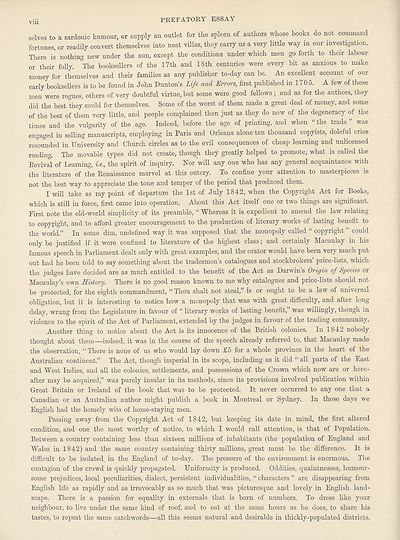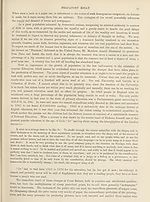New volumes of the Encyclopædia Britannica > Volume 30, K-MOR
(12) Page viii
Download files
Complete book:
Individual page:
Thumbnail gallery: Grid view | List view

PREFATORY ESSAY
viii
selves to a sardonic humour, or supply an outlet for the spleen of authors whose books do not command
fortunes, or readily convert themselves into neat villas, they carry us a very little way in our investigation.
There is nothing new under the sun, except the conditions under which men go forth to their labour
or their folly. °Tlie booksellers of the 17th and 18th centuries were every bit as anxious to make
money for themselves and their families as any publisher to-day can be. An excellent account of our
early booksellers is to be found in John Dunton’s Life and Errors, first published in 1705. A few of these
men were rogues, others of very doubtful virtue, but some were good fellows ; and as for the authors, they
did the best they could for themselves. Some of the worst of them made a great deal of money, and some
of the best of them very little, and people complained then just as they do now of the degeneracy of the
times and the vulgarity of the age. Indeed, before the age of printing, and when “the trade” was
engaged in selling manuscripts, employing in Paris and Orleans alone ten thousand copyists, doleful cries
resounded in University and Church circles as to the evil consequences of cheap learning and unlicensed
reading. The movable types did not create, though they greatly helped to promote, what is called the
Revival of Learning, i.e., the spirit of inquiry. Nor will any one who has any general acquaintance with
the literature of the Renaissance marvel at this outcry. To confine your attention to masterpieces is
not the best way to appreciate the tone and temper of the period that produced them.
I will take as my point of departure the 1st of July 1842, when the Copyright Act for Books,
which is still in force, first came into operation. About this Act itself one or two things are significant.
Pirst note the old-world simplicity of its preamble, “ Whereas it is expedient to amend the law relating
to copyright, and to afford greater encouragement to the production of literary works of lasting benefit to
the world.” In some dim, undefined way it was supposed that the monopoly called “ copyright ” could
only be justified if it were confined to literature of the highest class, and certainly Macaulay in his
famous speech in Parliament dealt only with great examples, and the orator would have been veq) much put
out had he been told to say something about the tradesmen’s catalogues and stockbrokers price-lists, which
the judges have decided are as much entitled to the benefit of the Act as Darwin’s Origin of Species or
Macaulay’s own History. There is no good reason known to me why catalogues and price-lists should not
be protected, for the eighth commandment, “Thou shalt not steal, is or ought to be a law of universal
obligation, but it is interesting to notice how a monopoly that was with great difficulty, and after long
delay, wrung from the Legislature in favour of “ literary works of lasting benefit, was willingly, though in
violence to the spirit of the Act of Parliament, extended by the judges in favour of the trading community.
Another thing to notice about the Act is its innocence of the British colonies. In 1842 nobody
thought about them—indeed, it was in the course of the speech already referred to, that Macaulay made
the observation, “ There is none of us who would lay down £5 for a whole province in the heart of the
Australian continent.” The Act, though imperial in its scope, including as it did “ all parts of the East
and West Indies, and all the colonies/settlements, and possessions of the Crown which now are or here¬
after may be acquired,” was purely insular in its methods, since its provisions involved publication within
Great Britain or Ireland of the book that was to be protected. It never occurred to any one that a
Canadian or an Australian author might publish a book in Montreal or Sydney. In those days we
English had the homely wits of home-staying men.
Passing away from the Copyright Act of 1842, but keeping its date in mind, the first altered
condition, and one the most worthy of notice, to which I would call attention, is that of Population.
Between a country containing less than sixteen millions of inhabitants (the population of England and
Wales in 1842) and the same country containing thirty millions, great must be the difference. It is
difficult to be isolated, in the England of to-day. The pressure of the environment is enormous. The
contagion of the crowd is quickly propagated. Uniformity is produced. Oddities, quaintnesses, humour-
some prejudices, local peculiarities, dialect, persistent individualities, “ characters ” are disappearing from
English life as rapidly and as irrevocably as so much that was picturesque and lovely in English land¬
scape. There is a passion for equality in externals that is born of numbers. To dress like your
neighbour, to live under the same kind of roof, and to eat at the same hours as he does, to share his
tastes, to repeat the same catchwords—all this seems natural and desirable in thickly-populated districts.
viii
selves to a sardonic humour, or supply an outlet for the spleen of authors whose books do not command
fortunes, or readily convert themselves into neat villas, they carry us a very little way in our investigation.
There is nothing new under the sun, except the conditions under which men go forth to their labour
or their folly. °Tlie booksellers of the 17th and 18th centuries were every bit as anxious to make
money for themselves and their families as any publisher to-day can be. An excellent account of our
early booksellers is to be found in John Dunton’s Life and Errors, first published in 1705. A few of these
men were rogues, others of very doubtful virtue, but some were good fellows ; and as for the authors, they
did the best they could for themselves. Some of the worst of them made a great deal of money, and some
of the best of them very little, and people complained then just as they do now of the degeneracy of the
times and the vulgarity of the age. Indeed, before the age of printing, and when “the trade” was
engaged in selling manuscripts, employing in Paris and Orleans alone ten thousand copyists, doleful cries
resounded in University and Church circles as to the evil consequences of cheap learning and unlicensed
reading. The movable types did not create, though they greatly helped to promote, what is called the
Revival of Learning, i.e., the spirit of inquiry. Nor will any one who has any general acquaintance with
the literature of the Renaissance marvel at this outcry. To confine your attention to masterpieces is
not the best way to appreciate the tone and temper of the period that produced them.
I will take as my point of departure the 1st of July 1842, when the Copyright Act for Books,
which is still in force, first came into operation. About this Act itself one or two things are significant.
Pirst note the old-world simplicity of its preamble, “ Whereas it is expedient to amend the law relating
to copyright, and to afford greater encouragement to the production of literary works of lasting benefit to
the world.” In some dim, undefined way it was supposed that the monopoly called “ copyright ” could
only be justified if it were confined to literature of the highest class, and certainly Macaulay in his
famous speech in Parliament dealt only with great examples, and the orator would have been veq) much put
out had he been told to say something about the tradesmen’s catalogues and stockbrokers price-lists, which
the judges have decided are as much entitled to the benefit of the Act as Darwin’s Origin of Species or
Macaulay’s own History. There is no good reason known to me why catalogues and price-lists should not
be protected, for the eighth commandment, “Thou shalt not steal, is or ought to be a law of universal
obligation, but it is interesting to notice how a monopoly that was with great difficulty, and after long
delay, wrung from the Legislature in favour of “ literary works of lasting benefit, was willingly, though in
violence to the spirit of the Act of Parliament, extended by the judges in favour of the trading community.
Another thing to notice about the Act is its innocence of the British colonies. In 1842 nobody
thought about them—indeed, it was in the course of the speech already referred to, that Macaulay made
the observation, “ There is none of us who would lay down £5 for a whole province in the heart of the
Australian continent.” The Act, though imperial in its scope, including as it did “ all parts of the East
and West Indies, and all the colonies/settlements, and possessions of the Crown which now are or here¬
after may be acquired,” was purely insular in its methods, since its provisions involved publication within
Great Britain or Ireland of the book that was to be protected. It never occurred to any one that a
Canadian or an Australian author might publish a book in Montreal or Sydney. In those days we
English had the homely wits of home-staying men.
Passing away from the Copyright Act of 1842, but keeping its date in mind, the first altered
condition, and one the most worthy of notice, to which I would call attention, is that of Population.
Between a country containing less than sixteen millions of inhabitants (the population of England and
Wales in 1842) and the same country containing thirty millions, great must be the difference. It is
difficult to be isolated, in the England of to-day. The pressure of the environment is enormous. The
contagion of the crowd is quickly propagated. Uniformity is produced. Oddities, quaintnesses, humour-
some prejudices, local peculiarities, dialect, persistent individualities, “ characters ” are disappearing from
English life as rapidly and as irrevocably as so much that was picturesque and lovely in English land¬
scape. There is a passion for equality in externals that is born of numbers. To dress like your
neighbour, to live under the same kind of roof, and to eat at the same hours as he does, to share his
tastes, to repeat the same catchwords—all this seems natural and desirable in thickly-populated districts.
Set display mode to:
![]() Universal Viewer |
Universal Viewer | ![]() Mirador |
Large image | Transcription
Mirador |
Large image | Transcription
Images and transcriptions on this page, including medium image downloads, may be used under the Creative Commons Attribution 4.0 International Licence unless otherwise stated. ![]()
| Encyclopaedia Britannica > New volumes of the Encyclopædia Britannica > Volume 30, K-MOR > (12) Page viii |
|---|
| Permanent URL | https://digital.nls.uk/193567657 |
|---|
| Attribution and copyright: |
|
|---|---|
| Shelfmark | EB.18 |
|---|---|
| Description | Ten editions of 'Encyclopaedia Britannica', issued from 1768-1903, in 231 volumes. Originally issued in 100 weekly parts (3 volumes) between 1768 and 1771 by publishers: Colin Macfarquhar and Andrew Bell (Edinburgh); editor: William Smellie: engraver: Andrew Bell. Expanded editions in the 19th century featured more volumes and contributions from leading experts in their fields. Managed and published in Edinburgh up to the 9th edition (25 volumes, from 1875-1889); the 10th edition (1902-1903) re-issued the 9th edition, with 11 supplementary volumes. |
|---|---|
| Additional NLS resources: |
|
![[Page vii]Prefatory essay](https://deriv.nls.uk/dcn4/1935/6764/193567646.4.jpg)
